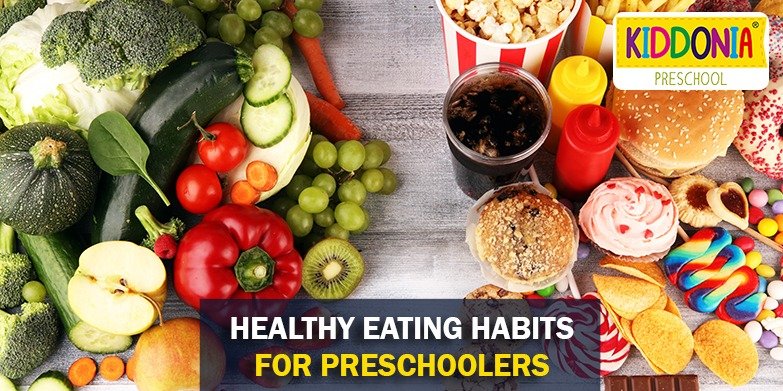Healthy eating habits are essential for everyone, especially preschoolers, as it lays the foundation for a lifetime of good health. Encouraging healthy eating habits in early childhood helps prevent childhood obesity, reduces the risk of chronic diseases, and promotes overall physical and cognitive development.
Here are some healthy eating habits for preschoolers:
- Offer a Variety of Foods: Offering a variety of foods is essential for preschoolers to develop a taste for different foods and get all the necessary nutrients. Make sure to offer foods from all food groups, including fruits, vegetables, whole grains, dairy and protein. Offer different types of fruits and vegetables, such as berries, melons, broccoli, carrots and sweet potatoes.
- Limit Processed Foods: Processed foods are high in added sugar, salt, and fat, which can increase the risk of obesity and chronic diseases. Limit the intake of processed foods such as cookies, chips, soda and fast food. Instead, offer whole foods, such as fresh fruits and vegetables, whole grains and lean protein.
- Involve Your Child in Meal Preparation: Involve your child in meal preparation and cooking. This can help them develop an interest in healthy foods and make them more likely to try new foods. Let them help you wash fruits and vegetables, measure ingredients and stir the pot.
- Make Mealtime Fun: Make mealtime fun and enjoyable for your child. Offer different colors and textures of foods, use fun plates and let them help set the table. You can also make fun shapes with fruits and vegetables, such as cutting watermelon into stars or making a smiley face with cucumber slices.
- Offer Small Portions: Preschoolers have small stomachs, so offer small portions of food. Offer snacks between meals, such as cut-up fruits, yogurt, or cheese sticks, to keep them full and satisfied.
- Don’t Force Your Child to Eat: Don’t force your child to eat if they’re not hungry. It’s normal for children to have ups and downs in their appetite. If they’re not hungry, don’t pressure them to eat. Encourage them to eat when they’re hungry and stop when they’re full.
- Be a Role Model: Be a positive role model for your child by practicing healthy eating habits yourself. Children learn by example, so if they see you eating healthy foods and enjoying them, they’re more likely to do the same.
- Limit Sugary Drinks: Sugary drinks, such as soda, juice, and sports drinks, are high in added sugar and can lead to tooth decay and obesity. Encourage your child to drink water or milk instead.
- Offer Healthy Snacks: Offer healthy snacks between meals, such as cut-up fruits, vegetables, whole-grain crackers or yogurt. Avoid offering snacks that are high in sugar, salt or fat.
- Make Breakfast a Priority: Breakfast is the most important meal of the day, as it provides the energy and nutrients needed to start the day. Offer a healthy breakfast, such as whole-grain cereal with milk and fruit, or scrambled eggs with whole-grain toast.
- Conclusion
Establishing healthy eating habits in preschoolers is essential for their overall health and well-being. Offer a variety of foods, limit processed foods, involve your child in meal preparation, make mealtime fun, offer small portions, don’t force your child to eat, be a positive role model, limit sugary drinks, offer healthy snacks and make breakfast a priority. By implementing these habits, you can help your child develop a taste for healthy foods and set them on a path to a healthy future.

